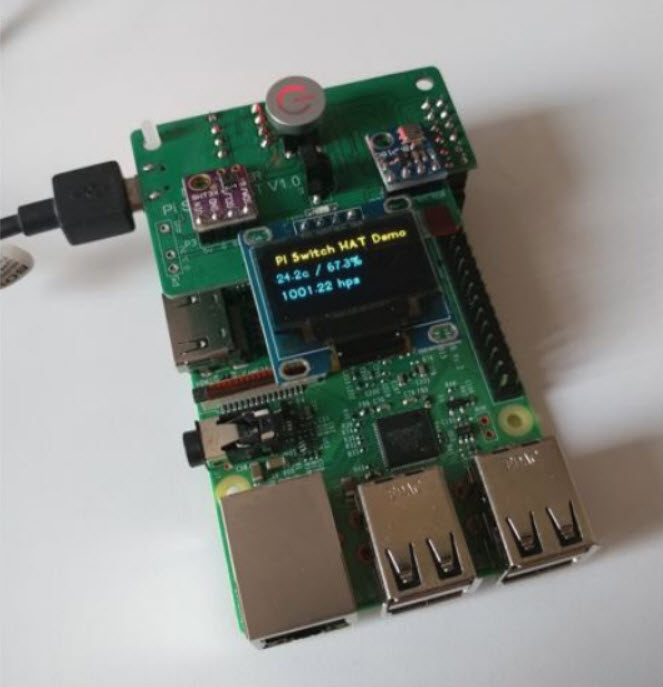Power switch Shut down script
The ProdBoard has an onboard power switch using the the same design as Nanomesher Hackable Raspberry Pi Power Switch
For software installation, please one of the following:
-
“Software Installation” section in Hackable Raspberry Pi Switch Quick Start
- “Software Installation” section in https://nanomesher.com/diy/raspberry-pi-support/
Samples Code
Examples are here.
In order to use the examples, you will need to install the following dependent libraries.
Python GPIO
sudo apt-get install python-dev python-rpi.gpio
Luma.OLED Python Library – For OLED display
Hackable Pi Switch Cap uses i2c OLED display with ssd1306 driver.
Library Info: https://pypi.python.org/pypi/luma.oled
Install Instructions: http://luma-oled.readthedocs.io/en/latest/install.html
More display examples from Luma.OLED: https://github.com/rm-hull/luma.examples
LIRC library
LIRCDemo.py required LIRC to be installed.
To be able to run the example, do the following (assuming Raspbian):
- Install LIRC
sudo apt-get install lirc
- In /boot/config.txt, add/edit the following line
dtoverlay=lirc-rpi,gpio_in_pin=17
- Setup for i2c communications with display and LIRC for infrared in /etc/modules
# /etc/modules: kernel modules to load at boot time. # # This file contains the names of kernel modules that should be loaded # at boot time, one per line. Lines beginning with “#” are ignored. i2c-dev lirc_dev lirc_rpi gpio_in_pin=17
- If using Raspbian Stretch, in /etc/lirc/hardware.conf , add/edit the following line
LIRCD_ARGS=”–uinput –listen”
LOAD_MODULES=true
DRIVER=”default”
DEVICE=”/dev/lirc0″
MODULES=”lirc_rpi”
- If using Raspbian Stretch, in /etc/lirc/lirc_options.conf, add/edit the following line
- Copy files from https://github.com/nanomesher/Nanomesher_PiSwitchCap/tree/master/lirc to /etc/lirc/
cd ~ git clone https://github.com/nanomesher/Nanomesher_PiSwitchCap.git cd ~/Nanomesher_PiSwitchCap/lirc sudo cp -rT ~/Nanomesher_PiSwitchCap/lirc /etc/lirc
- Reboot
- Test your lirc set up with irw and pressing your remote buttons
- Install LIRC python library: https://pypi.python.org/pypi/python-lirc/ or use this method if you dont want to use python-lirc.
#For python 3.x, Raspbian Jesse or earlier
sudo apt-get install python3-lirc
#For python 2.x, Raspbian Jesse or earlier
sudo apt-get install python-lirc
#For python 3.x, Raspbian Stretch
wget https://github.com/tompreston/python-lirc/releases/download/v1.2.1/python3-lirc_1.2.1-1_armhf.deb
sudo dpkg -i python3-lirc_1.2.1-1_armhf.deb
#For python 2.x, Raspbian Stretch
wget https://github.com/tompreston/python-lirc/releases/download/v1.2.1/python-lirc_1.2.1-1_armhf.deb
sudo dpkg -i python-lirc_1.2.1-1_armhf.deb
Examples
LEDDemo.py - Blink the onboard LED Twice OLEDDisplayDemo.py - Display IP addresses on the OLED
Weather Pack
Weather Pack composed of two i2c sensors:
- BOSCH BMP180 Pressure Sensor – Data Sheet
- SENSIRION SHT31 Humidity and Temperature Sensor – Data Sheet
Solder the sensors as shown below:

These python libraries are recommended to read sensors values: